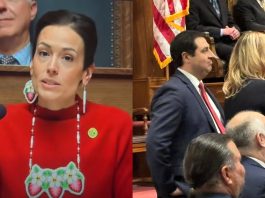“Hand picking circuit court judges to perform political maneuvering is unimaginable. Yet, my colleagues persist and appear to do this, all in
furtherance of delivering partisan, political advantage to the Democratic Party” – Wisconsin Supreme Court Justice Annette Ziegler.
The Wisconsin Supreme Court allowed legal challenges to the state’s congressional maps to continue forward, appointing two separate three–judge panels to hear the cases, an action that a top legal organization says violates the U.S. Constitution. (See our story exploring the backgrounds of the judges here. They all have significant Democrat ties.)
The action provoked fiery dissents from the court’s two conservative justices, with Justice Annette Ziegler arguing that the partisan liberal majority handpicked “circuit court judges to perform political maneuvering,” which she called unimaginable and a “charade.”
“Yet, my colleagues persist and appear to do this, all in furtherance of delivering partisan, political advantage to the Democratic Party.”
Ziegler accused the plaintiffs of having “cited no authority in support of their extraordinary legal theory, this court accepts their approach wholesale without demonstrating any legal analysis, critical reasoning, or attempt to reconcile this unprecedented proceeding with constitutional constraints.”
She wrote that the court’s liberals were seizing a role assigned to the Legislature. “Today is not a good day for Wisconsin’s judicial system. Our court has undermined its own constitutional authority in furtherance of affording the Democratic Party even more partisan political advantage than it already has with Governor Evers’ congressional maps in place,” Ziegler wrote.
Justice Rebecca Bradley also dissented, writing, “The Wisconsin Constitution plainly prohibits a circuit court— empaneled by this court or not—from adjudicating a challenge to a final judgment of the supreme court. The majority nevertheless entertains yet another kick at the redistricting cat. Unlike Schrödinger’s cat, this one most assuredly has been dead for years. I dissent.”
The Wisconsin Institute for Law & Liberty vowed to fight the action, saying it would violate the U.S. Constitution.
“The Wisconsin Institute for Law & Liberty (WILL) had argued against such an appointment as any attempt to redraw the Congressional district lines in this manner would violate the U.S. Constitution,” WILL said in a news release. “These efforts also threaten to plunge Wisconsin’s election cycle into uncertainty just months before the next election season kicks off.”
 The decision was 5-2, with the conservative justices dissenting and Brian Hagedorn joining the partisan liberals on the court.
The decision was 5-2, with the conservative justices dissenting and Brian Hagedorn joining the partisan liberals on the court.
“Revisiting the congressional maps so late into the political cycle invites endless litigation and throws our electoral process into chaos,” WILL Deputy Counsel, Lucas Vebber, said.
“The state’s current maps, which have now been used for several election cycles, are lawful and should stand,” WILL wrote in a news release on November 25. “These attempts to redraw Wisconsin’s map for partisan political gain are outrageous, and exactly what the U.S. Supreme Court warned state courts not to do. WILL plans to defend the current maps and ensure the stability that Wisconsin voters, candidates, and election officials deserve, and which the Constitution requires.”
In 2022, according to WILL, the Wisconsin Supreme Court “adopted new congressional maps drawn by Governor Tony Evers to correct population changes that occurred over the previous decade. This should have been the end to the legal and political posturing until the 2030 census.”
However, various groups “have repeatedly tried to challenge those congressional maps in the ensuing years. The Wisconsin Supreme Court had already denied multiple attempts to redraw those maps. These most recent cases, filed in Dane County, is the third attempt,” added WILL.
 The lawsuits allege that the current map is gerrymandered and that they protect incumbents by eliminating competition.
The lawsuits allege that the current map is gerrymandered and that they protect incumbents by eliminating competition.
Law Forward, a liberal law firm, applauded the decision, writing, “Law Forward is pleased that the Wisconsin Supreme Court has appointed a panel of three circuit court judges to hear a lawsuit we filed on behalf of our clients, including Wisconsin Business Leaders for Democracy and several individual Wisconsin voters, challenging Wisconsin’s congressional districts as an anti-competitive gerrymander.”
The conservative judges strongly criticized the process the liberals used to pick the judges on the panels.
“Compounding the constitutional violations is the opaque process by which my colleagues selected the three-judge panel,” Ziegler wrote in the first dissent. “There has been no disclosure of criteria, no explanation of procedure, and no transparency whatsoever. Not that these judges bear any fault in their selection, but there are over 260 circuit judges in our state, and we have no information on how or why these six judges were picked.”
In a dissent, Justice Annette Ziegler wrote, “Compounding the constitutional problems which prohibit a circuit court panel from reconsidering or overturning our decisions, the selection process for this hand-picked panel lacks even a hint of transparency. Behind closed doors, 2 my colleagues chose three circuit court judges to consider apportioning, not redistricting, court-established congressional maps— something this panel is not constitutionally empowered to do.”

In the first case, Hagedorn noted in a partial dissent that he believed that choosing “a randomly-selected panel and venue would be a better way to fulfill the statutory mandate. Instead, my colleagues have chosen to keep this case in Dane County and leave the originally assigned Dane County judge on the panel. The court has also hand-selected two additional judges rather than using a neutral process.”
He added, “This approach is an odd choice in the face of a statute so clearly designed to deter litigants from selecting their preferred venue and judge.”
According to Bradley, “The members of this court, however, swore an oath to uphold the Wisconsin Constitution, which prohibits lower courts from reconsidering decisions of this supreme court. The Wisconsin Constitution is superior to the
Wisconsin Statutes, and is dispositive.”
She noted, “After the 2020 Census revealed malapportionment, the Wisconsin Legislature drew new maps, but Governor Evers vetoed them. This political impasse prompted an original action, which this court granted to remedy the unconstitutional malapportionment produced by population shifts. Thereafter, both the United States Supreme Court and this court denied multiple challenges to the constitutionality of the congressional map.”
The panels are:
Judge Julie Genovese, Dane County (elected in 2009; re-elected
in 2015, 2021);
Judge Emily Lonergan, Outagamie County (appointed in 2019
by Governor Evers; elected in 2020); and
Judge Mark Sanders, Milwaukee County (elected in 2012; re-
elected in 2018, 2024
Judge David Conway, Dane County (appointed in 2020 by
Governor Evers; elected in 2021);
Judge Patricia Baker, Portage County (appointed in 2021 by
Governor Evers; elected in 2022); and
Judge Michael Moran, Marathon County (elected 2011; re-
elected in 2017, 2023).
We will explore the judges appointed in a follow-up article.












